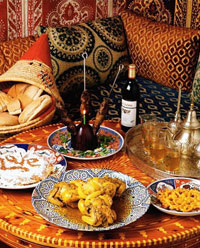New Lucky Restaurant in India offers dinner amid graves
Death in India is regarded as a part of life, as well as a part of lunch. New Lucky Restaurant in Ahmadabad is famous due to its cuisine and graves between tables.

It's a spot where old men page through newspapers and argue politics in the morning while young couples share candlelit meals and hold hands at night. That the candles sit atop graves only adds to the ambiance.
Krishan Kutti Nair has helped run the restaurant built over a centuries-old Muslim cemetery for close to four decades, but he doesn't know who is buried in the cafe floor. Customers seem to like the graves, which resemble small cement coffins, and that's enough for him.
"The graveyard is good luck," Nair said one recent afternoon after the lunch rush. "Our business is better because of the graveyard."
The graves are painted green, stand about shin high, and every day the manager decorates each of them with a single dried flower. They're scattered randomly across the restaurant - one up front next to the cash register, three in the middle next to a table for two, four along the wall near the kitchen.
The waiters know the floor plan like a bus driver knows his route, and they've mastered the delicate dance of shimmying between graves with a tray of hot tea in each hand.
"We're used to it," said waiter Kayyum Sheikh. "There's nothing odd about it."
The graves probably belong to the family or associates of a 16th-century Sufi saint whose tomb is nearby, according to Varis Alvi, a retired professor in Ahmadabad .
The restaurant dates to the 1950s - before honking traffic and tall buildings surrounded the site - when K.H. Mohammed opened a tea stall outside the cemetery, said Nair, who helped run the place and became Mohammed's partner. Business was good, and the stall kept expanding until its tin walls encircled the graves. Mohammed died in 1996.
In India , where three times the population of the United States is packed into an area one-third the size, it's common for cemeteries to serve multiple purposes, said Alvi. Newcomers to cities set up tents inside graveyards, and businesses set up stalls next to graves.
Besides, the Hindu notion of death as merely an opportunity for rebirth makes the prospect less frightening than it is in the West, Alvi said. Although the tea shop cemetery is Muslim - Hindus cremate their dead - most Indians would feel comfortable relaxing in a cemetery, he said.
"Graveyards in India are never scary places," Alvi said. "We don't have a nice literature of horror stories so we don't have much fear of ghosts."
Most customers said they don't mind sitting next to graves.
"We spend all day here," Mohammed Tafir said between cups of tea. "The graves are holy, they're good luck. They bring us good luck too."
Some, though, say the restaurant is disrespectful.
"They should maintain the decorum of the graveyard," said a history professor who asked that his name be withheld. When asked why he didn't want to be identified, he smiled and said, "Because I have tea there."
Subscribe to Pravda.Ru Telegram channel, Facebook, RSS!





